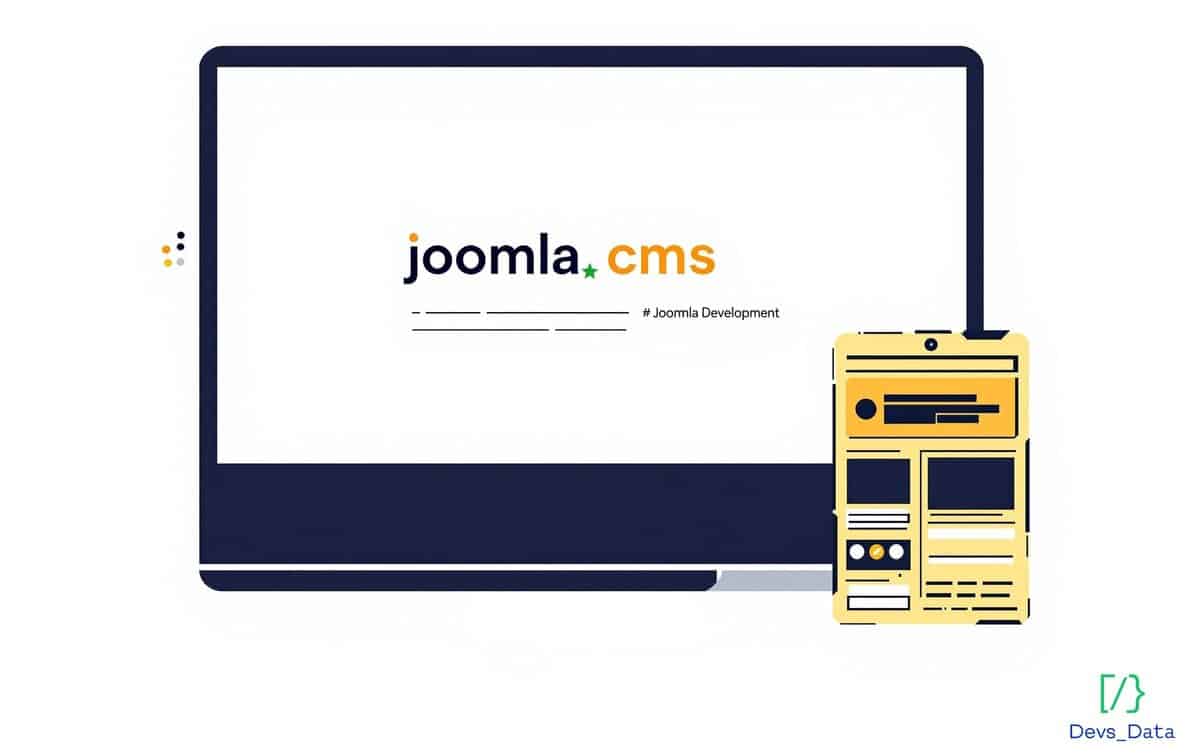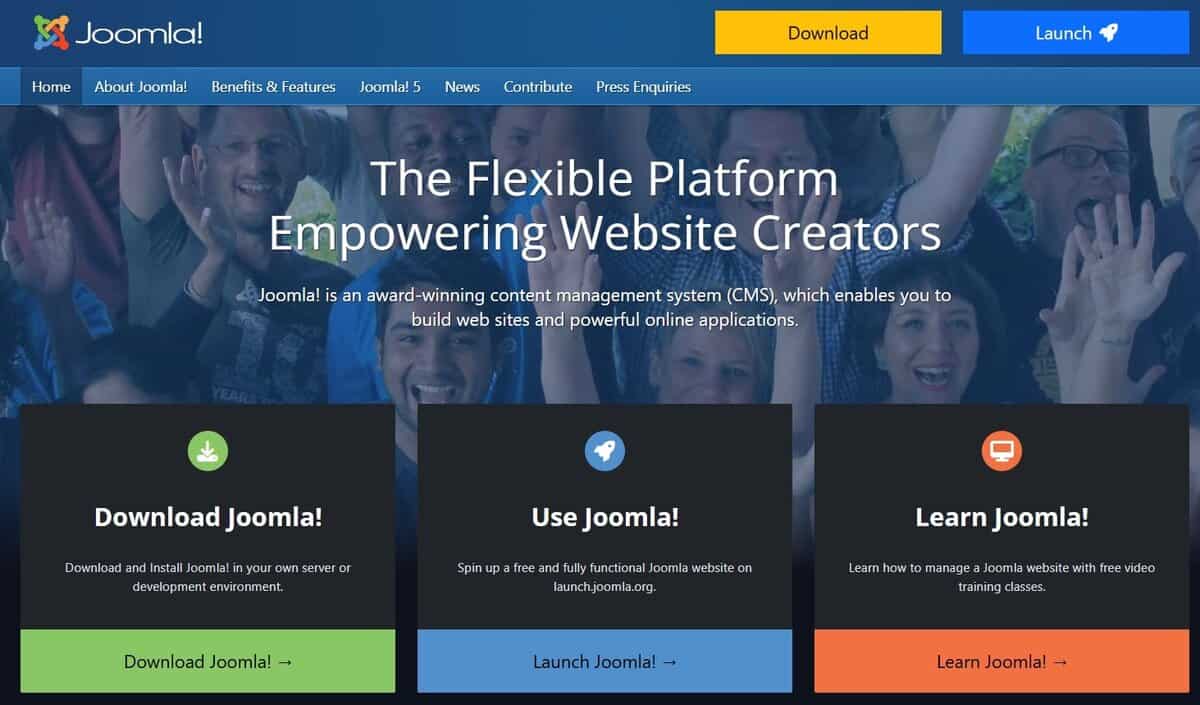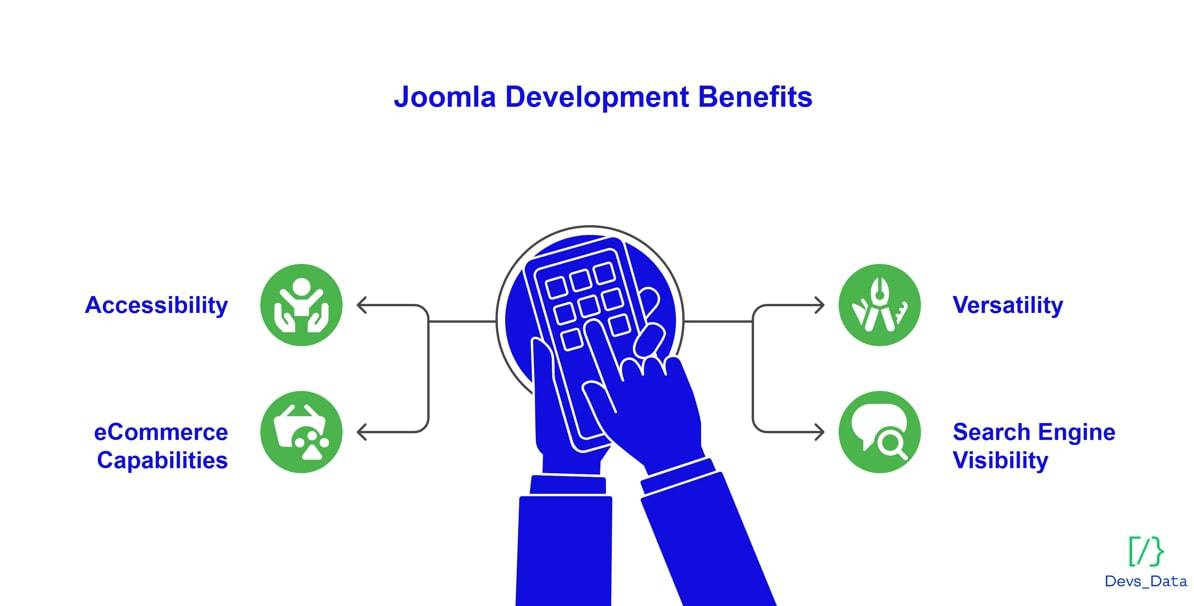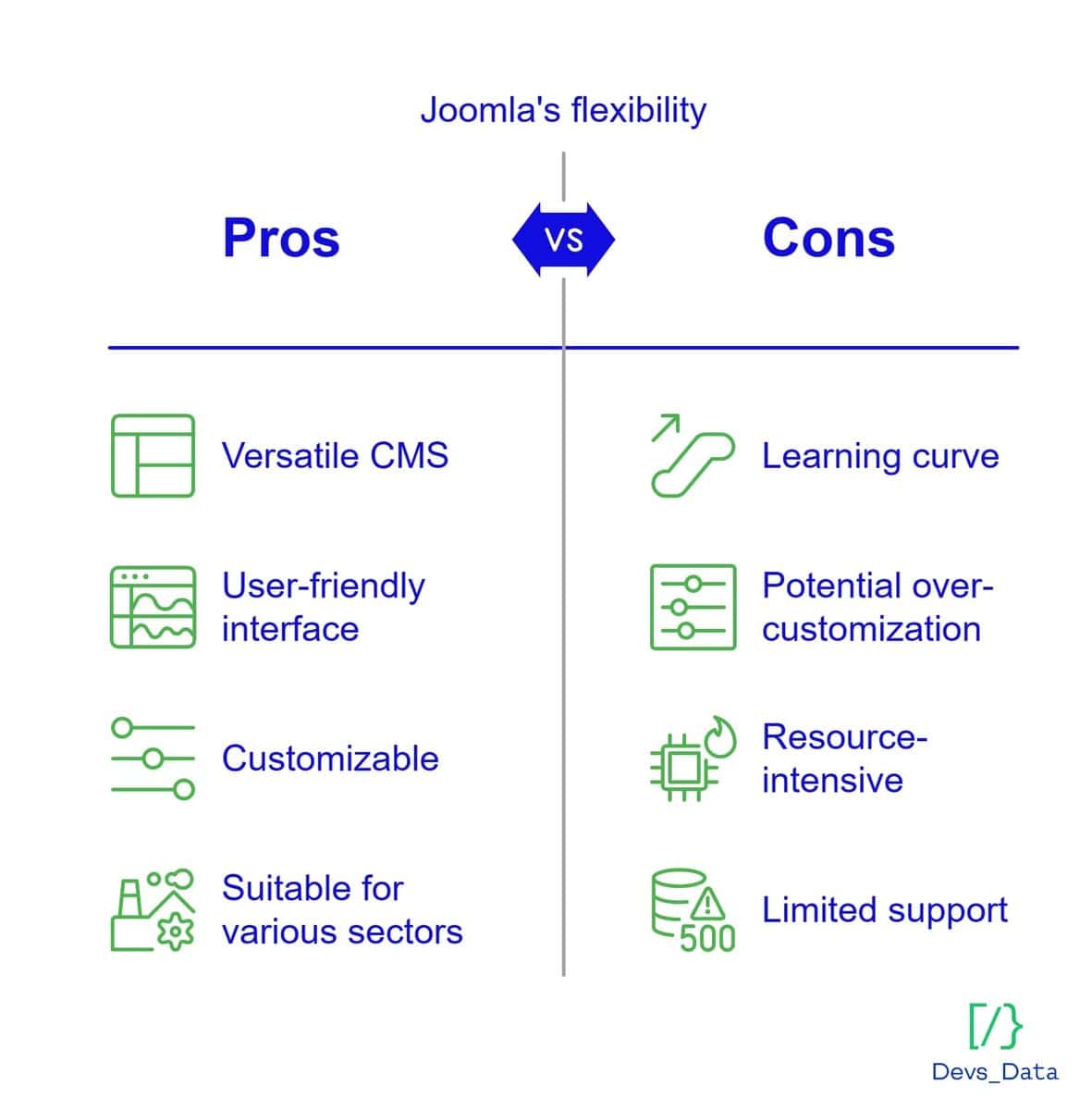


Joomla transforms abstract concepts into powerful web solutions through its advanced architecture and modular flexibility. This open source content management system (CMS) empowers businesses with intuitive content management capabilities while supporting complex functionalities across diverse project types. From corporate sites and eCommerce platforms to membership portals and community forums, Joomla adapts to varied requirements. Its architecture excels in managing multi-level content hierarchies, user authentication, and interactive elements, such as booking systems and application forms. Organizations value Joomla’s scalability, which allows for accommodating growing content volumes without compromising performance. This flexibility appeals to companies of all sizes, from small businesses launching their first website to large enterprises managing complex, multilingual platforms.
While WordPress dominates the CMS market, Joomla maintains a notable presence with approximately 2.5 million live websites currently running on the platform. The official Joomla website itself attracts between 700000 to 800000 visits monthly, demonstrating the platform’s continued relevance and active community engagement. This persistent market position stems from Joomla’s technical strengths in handling complex site structures, multilingual capabilities, and seamless integration with external business systems like CRM and ERP solutions.
This article examines Joomla development fundamentals, implementation challenges, and how DevsData LLC’s experience delivers exceptional results for clients with demanding requirements.

Created in 2005 as an offshoot of Mambo CMS, Joomla emerged as one of the pioneering content management systems. At its core, Joomla is an accessible website creation and management platform. Setting up a Joomla website begins with a straightforward installation process, configuring the system, and establishing the administration panel. This control center enables comprehensive website management—from basic settings adjustment to content creation, extension installation, and design customization.
The content management system organizes information through a hierarchical structure of articles and categories.
“Joomla’s market share among content management systems is 2.7%. Until 2021, Joomla was in second place after WordPress, and after that, it lost its share and dropped to fifth place.”
Website appearance relies on templates, whether pre-made or custom-built, that can be adjusted to fit specific visual requirements and brand identity. Joomla’s modular construction features three extension types: core components, display modules, and enhancement plugins. This setup lets websites expand their capabilities with thousands of tailored extensions. The platform also excels in permission management, enabling administrators to set user accounts with different access levels, which is especially useful for sites with multiple contributors. However, managing a large number of extensions or complex user roles can sometimes introduce compatibility issues or increase setup time, requiring careful planning during development.
Do you have software development needs?

Following Joomla 5.0’s late 2023 release, subsequent updates have improved platform performance, optimized backend processes, and reduced load times. Organizations now benefit from integrated SEO capabilities with automatic Schema.org functionality and comprehensive accessibility features, including dark mode and international compliance standards. Security has also seen notable upgrades, with enhanced core protections, faster patch deployment, and ongoing vulnerability monitoring. As security threats evolve, Joomla’s development team and community continue to prioritize rapid response to vulnerabilities and maintain strong data protection measures. The 2025 roadmap includes Joomla 5.3 (April) and Joomla 6 (October), which build on full support for PHP 8.1 and Bootstrap 5.3.2. These developments, supported by a global contributor community, keep Joomla in line with modern standards while maintaining its focus on accessibility, performance, security, and user-centered design.

Joomla stands out for its exceptional accessibility. Developers appreciate the intuitive interface that simplifies website management and content updates. The extensive developer network continuously creates new plugins, modules, and extensions, expanding functionality without requiring complex coding skills.
Versatility ranks among Joomla’s key strengths. The platform accommodates projects ranging from simple personal blogs to sophisticated corporate portals with equal efficiency. Its flexible architecture allows developers to craft tailored solutions that precisely match client specifications and business objectives.
Joomla provides comprehensive eCommerce capabilities for online retail ventures. The platform supports numerous specialized extensions that integrate essential elements like shopping carts, payment processing systems, and inventory management tools, creating seamless customer purchasing experiences. Industry leaders such as eBay, General Electric, IKEA, Holiday Inn, Harvard University, and ITWire all use Joomla to manage their online presence, demonstrating the platform’s flexibility and credibility across diverse business sectors.
“Search engine visibility represents another significant advantage of Joomla websites.”
The system includes various built-in SEO tools and configurations that help websites better position themselves in search results, potentially increasing visitor numbers and conversion opportunities.
Joomla offers distinct benefits when compared to its major competitors in the CMS market. When evaluating content management systems, organizations typically consider WordPress, Joomla, and Drupal as the leading open source options. These three platforms dominate the market due to their established communities, extensive functionality, and proven reliability across diverse implementation scenarios. In addition to WordPress and Drupal, which power millions of websites worldwide, there are several other notable content management platforms. Tesla’s main website, for example, is built on Drupal, showcasing its flexibility and reliability for large-scale projects. Webflow has become popular for its user-friendly, drag-and-drop editor, making it a top choice for designers who want to create sites visually without heavy coding. Strapi is an open-source, headless CMS based on Node.js, especially popular in Jamstack development. It currently has about 67000 stars on GitHub, reflecting strong support from the developer community. Ghost is another open-source platform built with Node.js, focused on publishing and blogging. It has attracted around 49500 GitHub stars, making it a significant choice for content-driven websites. These options highlight just how many ways organizations can approach website development, with each platform fitting different technical needs and creative workflows.
The following comparison highlights how Joomla excels in key areas:
| Feature | Joomla | WordPress | Drupal |
|---|---|---|---|
| Multilingual support | Native integration | Requires plugins | Strong but complex |
| Mobile compatibility | Built-in responsive tools | Basic responsiveness | Technical configuration needed |
| Security | Regular updates; Strike Team | Frequent updates; higher risk | Enterprise-grade protection |
| Community | Specialized developer groups | Largest ecosystem | Technical-focused community |
| Cost | Moderate development costs | Lower initial costs | Higher technical investment |
| Enterprise integration | Native API connections | Requires plugins | Excellent but complex |
Joomla particularly excels in balancing technical capabilities with user accessibility, offering sophisticated features without the steep learning curve of more complex systems or the limitations of simpler platforms. When comparing these CMS options, WordPress provides greater simplicity but often requires numerous plugins for advanced functionality, potentially creating compatibility issues. Drupal delivers exceptional power but demands significant technical expertise for proper implementation. Joomla positions itself strategically between these alternatives, providing substantial capabilities through its core architecture while maintaining manageable complexity for both developers and content administrators. The platform’s support for visual editors and user-friendly configuration tools also fits well with the growing demand for no-code and low-code website solutions.
Effective Joomla solutions require a strategic approach that combines technical expertise, user-centered design, and industry-specific adaptability. Organizations seeking to leverage this powerful CMS often partner with specialized development agencies that understand the platform’s nuances and can maximize its potential. These Joomla service providers play a crucial role in translating business requirements into technically sound implementations. DevsData LLC exemplifies this specialized expertise, building Joomla platforms that prioritize functionality, security, and seamless user experiences while carefully tailoring each implementation to address clients’ unique business objectives.

Cubus, an emerging European fashion brand in the Scandinavian market, required a comprehensive eCommerce solution for its expanding product line of clothing, cosmetics, and accessories. DevsData LLC developed a sophisticated Joomla-based platform that seamlessly connects online operations with brick-and-mortar stores. Key accomplishments included:
The team redesigned the information architecture, creating logical groupings and simplified interconnections between components. This restructuring shortened user paths and enhanced the shopping experience, differentiating Cubus in the Scandinavian market.
DevsData LLC transformed the Scandinavian-only platform into a multilingual system, expanding market reach. Implementation included language-specific payment processes and content tools that maintained brand consistency across localized versions.
The team created a beauty page concept with shortcuts, galleries, and strategic CTAs. This approach featured a refreshed color palette matching the brand’s photoshoot style, enhancing visual appeal while maintaining simplicity.

The Soap Kitchen, a UK-based retailer of handmade soaps and organic cosmetics, sought to enhance its online store’s efficiency and scalability. DevsData LLC developed a Joomla-powered eCommerce platform with features designed to streamline operations and improve customer engagement. Key deliverables included:
A custom inventory system tracks stock levels across multiple warehouses and sales channels in real time. Automated alerts for low stock and batch expiration dates ensure that perishable goods are managed proactively, reducing waste and preventing overselling.
The platform synchronizes orders from Etsy, eBay, and the company’s site into a unified dashboard. This integration eliminates manual data entry, reduces errors, and provides a holistic view of sales performance, enabling faster decision-making.
By optimizing images, leveraging caching mechanisms, and refining code structure, page load speeds improved by 40%. This enhancement boosted SEO rankings and reduced bounce rates, ensuring a smoother shopping experience across devices.
The project underscores how Joomla’s flexibility can address niche retail challenges while maintaining a visually cohesive brand identity.
Do you have software development needs?

Designer Journeys, a travel company with an international team spanning Asia-Pacific, Europe, Africa, and the Americas, required a platform to showcase dynamic content and simplify bookings. DevsData LLC implemented a Joomla-based solution, with key highlights including:
A modular content system allows Designer Journeys to update itineraries, testimonials, and promotional offers. Custom templates ensure visual consistency while enabling rapid publishing of new travel packages effortlessly.
The platform supports multiple languages with localized payment gateways and automated currency conversion. Integrated booking calendars and real-time availability updates reduce customer friction and streamline reservations.
SSL certification and GDPR-compliant data handling protect sensitive customer information. Travelers access personalized dashboards to view itineraries, make payments, and communicate with guides, enhancing trust and satisfaction.
This project demonstrates DevsData LLC’s capacity to support complex, multilingual platforms while maintaining intuitive navigation and aesthetic appeal.
Joomla offers powerful capabilities for website development, but teams often encounter specific technical hurdles during implementation and maintenance. At DevsData LLC, these challenges are addressed through proven methodologies and specialized expertise. Below are the most common Joomla development obstacles and how DevsData LLC overcomes them for clients across industries.
| Challenge | DevsData LLC’s Solution |
|---|---|
| Keeping extensions working well together | DevsData LLC tests all extensions before launch and uses reliable add-ons. Custom fixes help connect tools without breaking the website or causing errors. |
| Protecting against security threats | The team regularly checks for risks, updates software, and adds layers of security. Fast patching and frequent audits help stop problems before they start. |
| Improving website speed and stability | Websites are set up to load quickly with smart caching, a tidy database, and reliable servers. These steps help visitors get a smooth experience from any location. |
| Making custom designs and features easier to manage | DevsData LLC creates clear, easy-to-edit templates and documents every change. This makes future updates simple for both technical and non-technical teams. |
| Helping sites show up in search results | The company structures content in a way that search engines understand, uses clean code, and adds tools that help sites get noticed by Google and other platforms. |
| Organizing website content | DevsData LLC builds easy-to-use menus and clear categories, so teams can manage and update information with less hassle. |
| Ensuring the website works on all devices | The company tests each site on different phones and computers and adjusts the layout so everything looks and works right. |
| Keeping data safe and recoverable | Regular backups are set up, making it easy to restore the site if there’s a problem, so nothing important is lost. Every mature Joomla instance should have solid data backup in place, just like any production environment. Having a reliable backup helps protect against data loss and keeps the site running smoothly even if issues occur. |
| Helping clients learn and stay independent | Clear instructions and step-by-step guides are provided, making it simple for clients to manage their own site long-term. |
| Fast and reliable technical help | DevsData LLC watches for issues and fixes them quickly, offering direct support and helpful resources when clients need it. |
Joomla’s architecture provides exceptional flexibility for website development, though this adaptability comes with certain tradeoffs that organizations should consider before implementation.

Joomla’s flexibility makes it a go-to solution for organizations seeking a balance between simplicity and power. Its modular architecture lets users build anything from blogs to complex portals without starting from scratch. Extensions and templates slot in seamlessly, so sites can evolve as needs change. Regular updates and a strong developer community ensure the platform meets emerging web standards and user expectations.
Versatile CMS: Joomla supports a wide range of website types, from personal blogs to complex eCommerce sites. Its design helps both small businesses and larger organizations manage growth without major changes to their site structure.
User-friendly interface: The system includes straightforward menus and dashboards, making it possible for users without technical backgrounds to update content and manage website features.
Customizable: Joomla offers many extensions and templates that allow users to add new functions or change the site’s appearance to fit their needs. Customization is possible with simple settings or, for more advanced users, with CSS adjustments.
Suitable for various sectors: The platform is found in education, healthcare, nonprofit organizations, and government. Many universities, charities, and agencies use Joomla to manage their content and online resources.
While Joomla’s adaptability brings many benefits, it also introduces potential hurdles that teams should weigh before committing. New users may face a steeper learning curve than simpler platforms, and extensive customization can complicate maintenance. High-traffic or feature-rich sites may demand more server resources, and smaller projects sometimes struggle to find specialized support. Planning and clear governance help mitigate these issues.
Learning curve: Setting up and customizing Joomla can take time, especially for users without previous experience. Consulting official documentation or tutorials is often necessary during initial setup or when configuring user permissions and menu structures.
Extension management: Adding a large number of extensions may result in slower page loading or compatibility issues. Careful planning and selective use of add-ons help maintain stable site performance and simplify future updates.
Hosting requirements: Sites with advanced features or high visitor numbers typically require stronger hosting solutions. Shared hosting may not be sufficient for complex modules or heavy traffic, making early planning for infrastructure important.
Specialist support: While the Joomla community is active, locating developers familiar with specific or uncommon extensions can be difficult. Organizations may need to allocate additional resources for technical support on custom setups.
Joomla’s ecosystem makes it easier for organizations to build, maintain, and expand complex websites. The platform features a wide range of extensions and templates, active community forums, and professional support options. Integrations with tools such as CRM, ERP, payment gateways, and external platforms are widely available, helping companies connect their sites to essential business operations. With regular updates, clear documentation, and flexible options for custom features, Joomla adapts to different technical needs while supporting growth and security.
“The Joomla community has grown so much larger and stronger than we could have ever imagined. Today, Google search results on Joomla yield over 100 million results. The Joomla group of websites serves 1 million visitors per week.”
With numerous features and integration possibilities, selecting the right development partner is crucial for maximizing Joomla’s potential. An experienced team can help organizations fully leverage the platform’s capabilities while ensuring a smooth, secure, and efficient implementation.
Finding Joomla developers or the right agency begins with knowing your hiring goals and resources. Many companies recruit directly on job boards like Indeed and LinkedIn, which attract web development talent globally. In Poland, JustJoin.it is a go-to platform for technical hires, especially for PHP and Joomla experts. Businesses needing a faster or more specialized search may prefer working with recruitment agencies, which can pre-screen candidates. For projects needing immediate expertise, specialized Joomla agencies like DevsData LLC offer a proven, efficient option. Each approach has its own advantages depending on the team’s technical capacity, urgency, and project size.
Website: www.devsdata.com
Company size: ~60 employees
Founding year: 2016
Headquarters: Brooklyn, NY, and Warsaw, Poland
Joomla is built on PHP, so success with the platform depends on deep PHP expertise. DevsData LLC has extensive experience with PHP, both through managed IT services and the recruitment of highly skilled PHP engineers for client projects. Their background in PHP covers everything from maintaining complex applications to delivering large-scale software solutions for demanding industries.
Organizations seeking advanced Joomla development solutions benefit significantly from partnerships with technical teams possessing deep platform expertise. DevsData LLC approaches Joomla development through a comprehensive framework that addresses frontend aesthetics and backend functionality. The company’s experience is reflected in its portfolio of successful projects for clients across eCommerce, retail, and travel industries, as highlighted in the case studies above. By integrating user experience considerations with technical requirements, DevsData LLC helps businesses turn ideas into fully functional Joomla implementations. This balanced approach enables clients to leverage Joomla’s capabilities while maintaining strong performance and reliability.
With over 8 years of specialized experience in the technology sector, DevsData LLC has established a proven track record across diverse industries. Their technical foundation includes developers with over 10 years of experience in Joomla technologies, supported by Big Data and Machine Learning application specialists. This expertise enables their Google-level in-house engineers to create Joomla solutions that extend beyond basic templates to incorporate advanced functionality when appropriate. Their impressive portfolio now includes 100+ successfully delivered software projects for more than 80 clients worldwide, consistently earning perfect 5/5 client satisfaction ratings on both Clutch and GoodFirms platforms.
DevsData LLC has delivered Joomla projects for both large enterprises and fast-growing startups in countries such as the US and Israel. This broad experience enables the team to address a range of technical and business requirements. Clients benefit from a straightforward, structured process that focuses on secure, high-performing solutions aligned with their goals.
Do you have software development needs?
For further details on their Joomla development services, interested organizations can contact DevsData LLC at general@devsdata.com or explore additional information through their website at www.devsdata.com.
Joomla development is vital in modern web strategy, offering organizations powerful tools to create sophisticated online platforms. Its extensive capabilities support diverse business requirements while maintaining accessibility for content managers. Selecting a qualified development partner ensures optimal implementation, maximizing Joomla’s potential while avoiding common technical pitfalls that can undermine project success.
DevsData LLC transforms Joomla development through specialized expertise and proven methodologies. Their Google-level in-house engineers bring 8+ years of market experience to every project, delivering tailored solutions that address specific business needs. With US specialists working alongside their international team, they have completed over 100 software projects for more than 80 clients worldwide. Their comprehensive technical approach ensures Joomla implementations that combine visual appeal with optimized functionality.
For further details on DevsData LLC’s services, contact them at general@devsdata.com or explore their website at www.devsdata.com.
Frequently asked questions (FAQ)
DevsData – your premium technology partner
DevsData is a boutique tech recruitment and software agency. Develop your software project with veteran engineers or scale up an in-house tech team of developers with relevant industry experience.
Free consultation with a software expert
🎧 Schedule a meeting
FEATURED IN


DevsData LLC is truly exceptional – their backend developers are some of the best I’ve ever worked with.”
Nicholas Johnson
Mentor at YC, serial entrepreneur


 Build your project with our veteran developers
Build your project with our veteran developers
 Explore the benefits of technology recruitment and tailor-made software
Explore the benefits of technology recruitment and tailor-made software
 Learn how to source skilled and experienced software developers
Learn how to source skilled and experienced software developers




Categories: Big data, data analytics | Software and technology | IT recruitment blog | IT in Poland | Content hub (blog)
